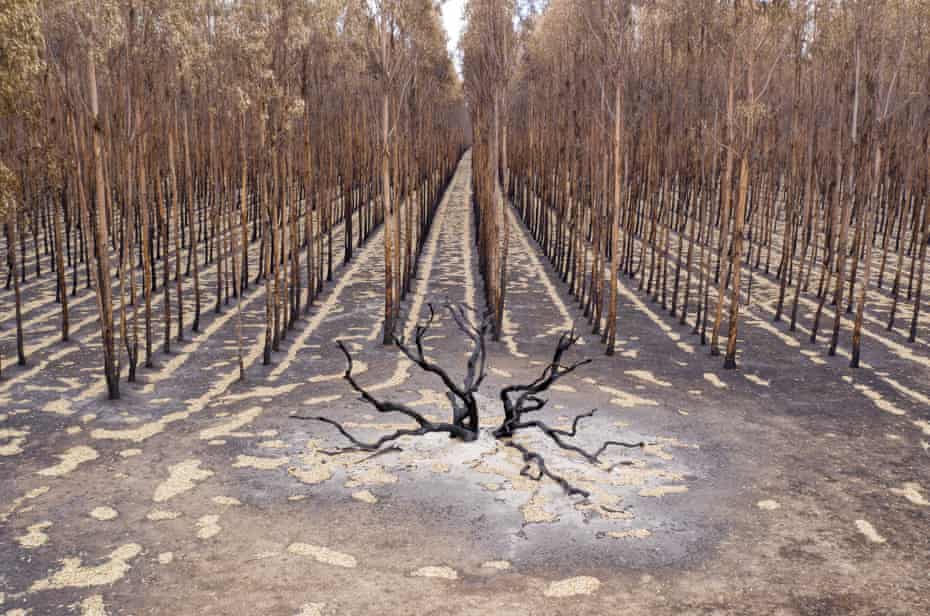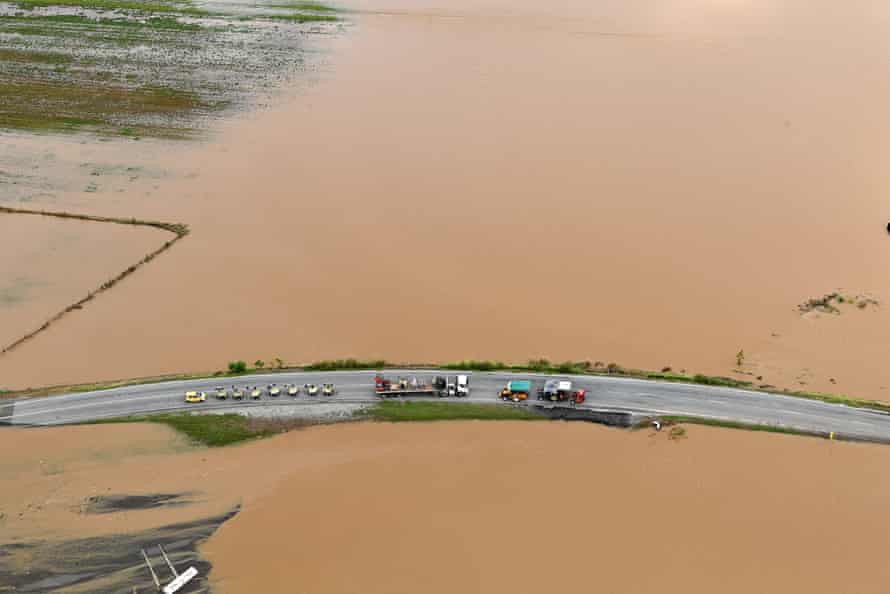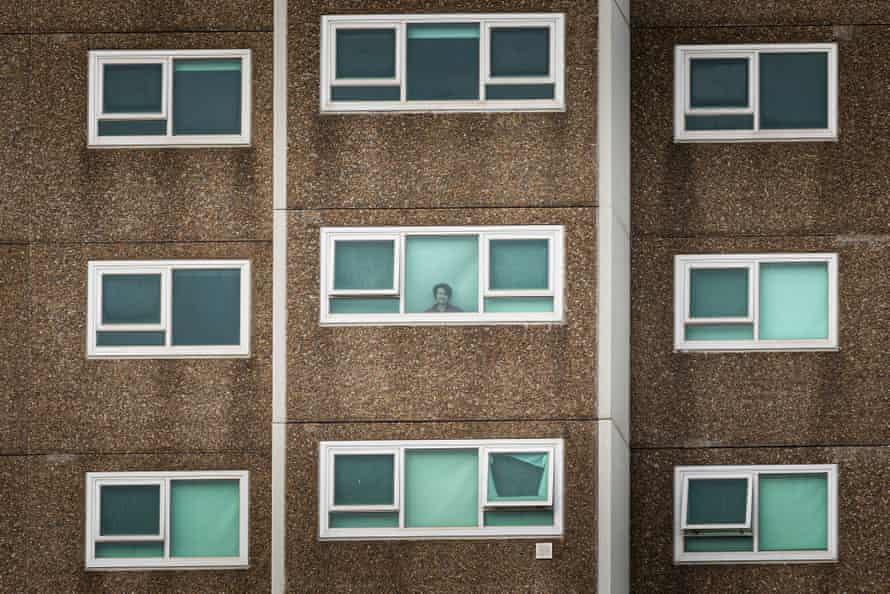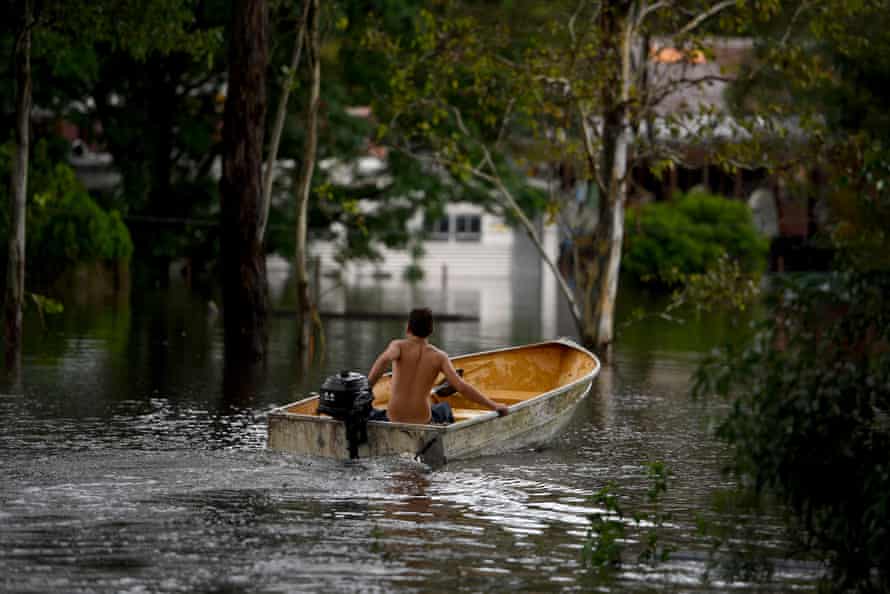Extract from The Guardian
Signs of collapse are everywhere, and if we think it’s possible to return to ‘normal’, then we are deluded.

A bushfire-ravaged part of Kangaroo Island, South Australia. ‘To look the climate crisis in the face, to stop believing this is a temporary aberration … is to take the first steps in addressing the climate problem,’ writes Brigid Delaney.
The vast gap between our memory of perfect summers and the reality we are living through is so vast as to cause a sort of cognitive break
In the summers we long for (sometimes nostalgically misremembered as bright and always perfect, warmly lit, always comfortable) the weather is hot (but not too hot) and life is lived outside. It is the season that we earn, sometimes live for, the reward for hard winters or wet springs, or just a tough year. They are our long, lovely golden days.
In our distress about these lost summers, there is a sadness about what we’re missing, but also a fear about what has replaced them. Biblical rain (roads transformed into rivers, waterways brown, dirty and dangerous), the 2019 smoke haze that transformed the sky, causing asthma, anxiety and neonatal damage, the bushfires that killed or displaced 3 billion animals, new fast-moving Covid variants that isolated thousands over Christmas, the 2020 and 2021 snap lockdowns. Of course we want our normal summers back!
The vast gap between our memory of perfect summers and the reality we are living through is so vast as to cause a sort of cognitive break. There are cows on the beaches. In order to live through this, we must think of it as a weird blip in the natural order.

Roads leading to the Queensland town of Gympie are cut off by flood waters. Photograph: Bradley Kanaris/Getty Images
The alternative when contemplating these disordered summers is to let terrifying apocalyptic thinking slip in. If we are no longer living in a world that we recognise, that no longer provides the certainties that gave our lives a reassuring rhythm, the effect is destabilising. We feel untethered from the Earth itself and its psychologically satisfying seasonal rhythms.
If for everything there is a season, what are these destructive summers for? Some ancient and superstitious instinct says they are the Earth itself retaliating after so much abuse, or a portent of a disordered world that is so far out of balance that it must initiate a cycle of creative destruction in order to restore homeostasis.
In ancient Greece, Stoic philosophers believed the Earth would be periodically destroyed by fire (Ekpyrosis) in a ritual cleansing before starting again. Stoics usually believed this event occurred when civilisation was at its very height of sophistication and complexity (like ours is now). In an echo of the modern environmental movement, Stoics believed that when the intact and perfect balance of nature called Gaia was interfered with, then collapse was inevitable.
Roman Stoic, playwright and political adviser Seneca believed Ekpyrosis would take the form of a flood.
James Romm, in his excellent biography of Seneca, wrote of Seneca’s unease as Rome expanded beyond its territorial boundaries, “As in the biblical tale of the Tower of Babel, the very complexity of civilisation seemed to carry the seeds of its own destruction … Where once a single ship had disturbed the natural order, Rome had now filled the seas with traffic, scrambling the races and dissolving global boundaries. In Seneca’s view … the ceaseless advance of the empire would turn the cosmos itself into an enemy. When everyone could go everywhere, when no boundary remained intact, total collapse might not be far off.”

A woman looks out the window of her apartment at the North Melbourne public housing flats in July 2020. Photograph: Asanka Ratnayake/Getty Images
This fear is an ancient impulse but now that it seems to be actually occurring, we are in deep denial. Signs of collapse are everywhere, but in our minds we think of this as an aberration – that next summer we’ll return to normal.
The nostalgia for summers past is a trap. If we desperately wish to get back to the past, if we think it’s even possible to return, then we are deluded.
The new reality is, in Donald Rumsfeld’s words, a known known. It’s been coming at us for some time, hundreds of thousands of reports predicting this disorder. The latest this week came from the Intergovernmental Panel on Climate Change which said along with more extreme weather events, there was “very high confidence” that some natural systems had already experienced irreversible change.
But for those of us in this age of collapse, trapped in a mental construct of what summer should look and feel like (not like this!), we are surprised and appalled when the predictions become reality.
A denial of reality is baked into the rhetoric. This week the New South Wales premier, Dominic Perrottet, described the Lismore floods as a “one-in-1,000-year event”, as if it was a freak occurrence, a matter of timing, unlikely to happen again for another 1,000 years.
There is a macabre comfort in this, that we will not live through this again – that is, until we realise these one-in-1000-year events keep happening, they keep piling up before our very eyes, daring us to wake up from our dreams and longings of normalcy. What more will it take?

Jayden Evans uses his boat to access his home cut off by flood water at South Windsor in Sydney’s north-west on Thursday. Photograph: Dan Himbrechts/AAP
Because there is a problem. The problem is both climate change itself but also our mindset: that the last few years are abnormal, that one day, hopefully soon, we will return to “normal” – and that golden seasonal rhythm we knew in the past will return unbroken.
In an excellent long read in the New York Times on the deadly California fires, Elizabeth Weil tackled the magical and nostalgic thinking we have around the seasons.
She writes the “climate crisis has caused us to get lost in time and space; we need to dig ourselves out of nostalgia and face the world as it exists. We’re living through a discontinuity. This is Steffen’s [Alex Steffen, a climate futurist] core point. ‘Discontinuity is a moment where the experience and expertise you’ve built up over time cease to work,’ he said. ‘It is extremely stressful, emotionally, to go through a process of understanding the world as we thought it was, is no longer there … There’s real grief and loss. There’s the shock that comes with recognizing that you are unprepared for what has already happened.’”
In trying to return to a set point of normal, to get things back to the way they were before the summer bushfires, before the pandemic, before the floods, we are preventing ourselves from adapting, and preventing ourselves from trying to solve the crisis of the world we are living in now. The past is gone. Those summers that we hold in our minds as a set point, a true north, are over. That time has finished, faded into myth and memory. This is how it is now – and we have to wake up.
No comments:
Post a Comment